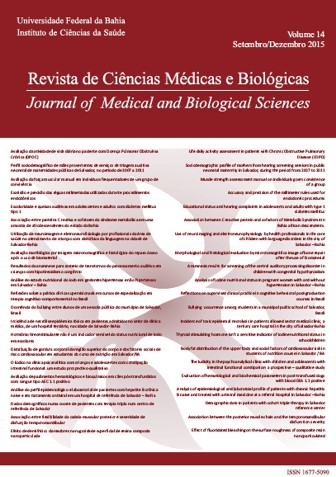Thyroid stimulating hormone isn’t a sensitive indicator of iodine nutritional status in schoolchildren
DOI:
https://doi.org/10.9771/cmbio.v14i3.14990Palavras-chave:
Iodine Deficiency. Thyroid Functions Tests. Thyroid Stimulating Hormone.Resumo
Introduction: iodine deficiency disorders (IDD) are most common cause of preventable brain damage, mental retardation and stunted growth in children worldwide. Several indicators are complementary to urinary iodine concentration (UIC) for assessing iodine nutritional status, as thyroid size, thyroglobulin (Tg) and thyroid stimulating hormone (TSH) concentrations in the blood. Objective: analyze TSH in filter paper blood values and correlate with UIC in schoolchildren from public school at state of Bahia, Brazil. Methodology: cross-sectional study was conducted in 880 schoolchildren aged 6-14 years, randomly selected, of public schools in five cities of four micro-regions of Bahia between October 2013 and September 2014. TSH was analyzed in filter-paper blood and UIC were measured by adapted Sandell-Kolthoff reaction. Results: 880 blood samples on filter-paper were analyzed for TSH. The reference range previously established is 0.72 to 6.0 μUI/mL. Results of this research TSH dosage ranged from 0.24 μIU/L to 7.71 μIU/L, with a mean of 1.01±0.55 μUI/L and median 0.89 μUI/L. Only one child presented TSH greater than 6.0 (7.71 μIU/L); however, results of urinary iodine were consistent with a more than adequate nutrition iodine (243.70μg/L). There’ no correlation between TSH and UIC (r= 0.115; p= 0.002). Conclusion: in the present study, schoolchildren showed low values of TSH, but the mean UIC was indicative of adequate iodine nutrition.
Downloads
Downloads
Publicado
Como Citar
Edição
Seção
Licença
A Revista de Ciências Médicas e Biológicas reserva-se todos os direitos autorais dos trabalhos publicados, inclusive de tradução, permitindo, entretanto, a sua posterior reprodução como transcrição, com a devida citação de fonte. O periódico tem acesso livre e gratuito.






